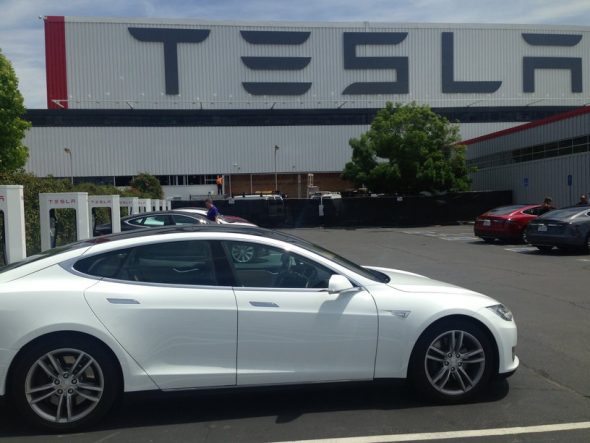Hydrogen fuel cell vehicles (HFCVs) appear to be making a comeback. But according to author, lecturer and entrepreneur Tony Seba, HFCVs can’t compete with electric vehicles. “The hydrogen economy would be a massively wasteful economy that would at best use three to six times more energy than an electric vehicle and solar/wind infrastructure and many times more water than even gasoline uses.”
The world has been abuzz about the recent Toyota announcement that the company opened up licensing of its 5,680 HFCV patents (although only until 2020.) By taking a page from the Tesla playbook, Toyota is hoping to encourage an ecosystem of fuel cell suppliers and hydrogen fueling stations. Is this the last hurrah of a dead-end technology? Or will it re-invigorate the HFCV market which has gone nowhere for decades? Does the Hydrogen Fuel-Cell Vehicle (HFCV) matter anymore?
Elon Musk, CEO of Tesla has called the HFCV ‘bullshit’. “Hydrogen is suitable for rockets but not for cars,” said Mr Musk. (Video, starting min 29:20.)
But Jim Lentz, CEO of Toyota North America says that his company is betting big on hydrogen fuel cell cars. Does the HFCV have a chance against the Electric Vehicle (EV)?
I don’t even mention HFCV’s in my book “Clean Disruption of Energy and Transportation”! There are multiple reasons for that. Let’s look at the facts, starting with the basics.
1) Hydrogen is not an energy source
Many industry insiders talk about hydrogen as if it were an energy source. For instance, they might compare it with, say, petroleum products like gasoline and diesel, and say that H2 produces no emissions. Hydrogen is not an energy source. It’s an energy carrier. It’s a form of storage. You need primary energy sources like the sun, coal, natural gas, or uranium to generate the power needed to extract Hydrogen from a source material like natural gas or water.
2) Electric Vehicles are at least three times more energy efficient than Hydrogen fuel cell vehicles
Assuming that at some point fuel-cells will be cheap and Hydrogen production will reach critical mass, it will still be at least three times more expensive to power an HFCV car than an EV. This figure from fuel cell expert Ulf Bossel explains how wasteful an HFCV is compared to electric vehicles.

But not all hydrogen vehicles are made alike. You can use compressed or liquefied hydrogen. You can also use either internal combustion engine or fuel cells to power the car. The following chart shows that whatever choice of type of hydrogen and engine results in the electric vehicle going three to six times more miles for the same energy when compared to hydrogen-powered cars.

3) You need to build a multi-trillion dollar hydrogen delivery infrastructure
To build a so-called “Hydrogen Economy” you need to build a multi-trillion dollar infrastructure with large factories/refineries, pipelines, trucks, storage facilities, compressors, hydrogen gas stations, and so on. If you haven’t noticed, this mirrors the existing oil & gas infrastructure.

Electric vehicles, on the other hand, have a ready infrastructure: the power grid. Everyone who lives and works in advanced economies has access to electricity. Yes, our grid is aging and we need to upgrade it, but it works today. Some readers may remember that the Internet started with the plain old telephone system. It wasn’t fast but it worked. Then we upgraded it to get the fast pipes that we have today. We also built a brand new wireless infrastructure that required no pipes at all.

The electric vehicle equivalent of the wireless power infrastructure is distributed solar.
The multi-trillion dollar hydrogen infrastructure would have to be built from scratch.
4) Hydrogen is not clean
About 95% of hydrogen in the US is made from natural gas in large central plants, according to the Department of Energy. It’s a method called natural gas reforming.

As I wrote in Clean Disruption of Energy and Transportation:
Methane (the main component of natural gas) is 72 times worse than CO2 as a greenhouse gas (when measured over twenty years). Natural gas leaks throughout the supply chain. It leaks when it is lifted from the ground, when it is stored, and when it is transported in hundreds of thousands of miles of pipelines. According to the U.S. Environmental Protection Agency, three trillion cubic feet of methane leak annually. That figure represents about 3.2 percent of global production. This methane leakage is the global warming equivalent of half the coal plants in the United States.
Today, hydrogen is basically a repackaged fossil fuel – a fossil product line extension, if you will. If you like natural gas and fracking you should love hydrogen.
5) Hydrogen is not ‘renewable’!
Hydrogen is classified as ‘renewable’ when it’s extracted from water by means of hydrolysis. This method involves applying high voltage electricity to split water into Oxygen and Hydrogen. When you apply conventional electricity to do the hydrolysis you still have to burn coal, natural gas, nuclear, petroleum, and so on, so you still have dirty hydrogen.
We need to pause to consider the water-energy-food nexus. Conventional energy is thirsty. In my books Clean Disruption and Solar Trillions I write at length about the obscene amounts of freshwater that coal, natural gas and biofuels consume. By adding Hydrogen to that list we would have yet another way for energy to dry up our planet.
A well-to-wheels analysis by University of Texas Professors Carey W. King and Michael E. Weber found that a HFCV would need to withdraw 13 gallons of water per mile driven. The same study concludes that a gasoline car would need withdrawals of needs 0.63 gal H2O/mile and a diesel car would need 0.46 gal H2O/mile. That is, gasoline petroleum-based transportation is 20 to 28 times more water efficient than hydrogen.
If we use solar or wind power as the source of the electricity for hydrolysis then you could have ‘clean’ and technically ‘renewable’ Hydrogen. I say ‘technically’ because the world is already pumping water at non-sustainable, non-renewable rates and the massive amounts of water you’d need for hydrogen would just contribute to the world’s water crisis. A 2015 World Economic Forum report ranks water crises as top global risk, up from number three the previous year.
Powering EVs using solar and wind would use no water, according to Profs King and Weber. Plus EVs are at least three times more energy efficient than Hydrogen Fuel Cell Vehicles.
6) Hydrogen Fuel Cell Vehicles can’t compete with Electric Vehicles
It makes sense for the fossil fuel industry to lobby for the hydrogen car because hydrogen is essentially a product line extension for them. In other words, the “Hydrogen Economy” is the “Fossil Fuel Economy” with a green sheen.
The HFCV is a substitute technology. If successful, hydrogen would just substitute the fossil fuel infrastructure with a mirror hydrogen infrastructure.
Former DOE Secretary Steven Chu said: “We asked ourselves, ‘Is it likely in the next 10, 15, or 20 years that we will convert to a hydrogen car economy?’ The answer was no.”
It’s obvious why I don’t even mention HFCV in my book “Clean Disruption of Energy and Transportation”! Hydrogen Fuel Cell Vehicles are neither clean nor disruptive. At best, a hydrogen economy would still be a massively wasteful economy that would at best use three to six times more energy than an electric vehicle and solar/wind infrastructure and many times more water than even gasoline uses. There are many good reasons why hydrogen fuel-cell vehicles are stuck in reverse while electric vehicles are on hyper-drive.
By 2030, 100% of cars will be electric and they will be 100% powered by solar and wind.
It’s time to move on from hydrogen fuel cell vehicles.
Source: Energy Post. Reproduced with permission.











